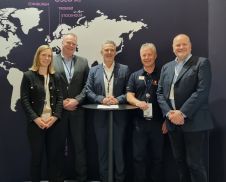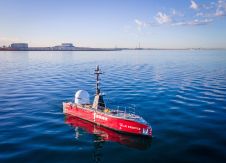"Hydrography is the Leading Marine Geospatial Service"
Hydro International Interviews Peter Ehlers, World Maritime University
Looking at the programme of the Hydro16 Conference, that was held in Rostock-Warnemünde, Germany, one of the keynote speakers was particularly remarkable, namely the legal specialist Peter Ehlers, who talked about maritime governance. What do maritime law and the rather ‘practical’ discipline of hydrography have in common related to this subject? 'Hydro International' interviewed Peter Ehlers on this aspect and discovered that hydrography plays a prominent role.
From law to hydrography – what brought you into the profession?
I am a lawyer and I have learned to ask questions until you know what you are talking about. I started during my study at the Federal Ministry of Transport and once I finished my dissertation on the IMO, I stayed there. I got into the hydrographic organisation and established the BSH. At the beginning, it felt like working in a scientific organisation while we should work like an authority. I have had the opportunity to shape the organisation and bring it forward. I always loved the economic aspects of the work, but there are actually three dimensions to hydrography: legal, technical and scientific. We tend to divide questions into sectors, but in reality, they are interlinked. You can’t divide them.
What links maritime governance and hydrography?
Actually, I would rather talk about ocean governance, whatever it means. You can’t translate it in the German language, it’s about controlling and managing maritime affairs aiming at sustainable development. One of the prerequisites is that we don’t know enough of the seas. Hydrography is providing data that is complimentary to oceanography, it goes further than just safety for navigation. There are more aspects of the sea and ocean. Hydrographic data is the main geospatial data service.
When thinking of ‘governance’, the relationship with the environment is close. What do you think of that relationship?
The marine biodiversity goes beyond national jurisdiction and it takes time before people see the consequences on what’s happening. In the eighties, the UNCLOS discussions started but no one discussed this issue. The polluter pays, seemed to be the status quo. We have to develop this further, the environment is more important. That’s where geospatial data comes into play.
How do you think these geospatial data can best be collected?
There are three aspects on the collection of maritime data: oceanography, hydrography and marine environmentalists. Currently, it seems that they operate as different pillars – there should be more cooperation between them as their interests are interlinked. For example, traditionally when oceanographers go out for their measurements, they don’t include the hydrographic data. And with the current increased possibilities, a hydrographic survey can have oceanographic measurements as ‘by-product’. I’m convinced we can achieve more by collecting and exchanging the data more intensively.. We can collect more data. This is both an advantage and a difficulty: we have to select the right data.
How do you think data should be made available?
One has to start the discussion about this subject. For example, many research vessels are publicly funded. So why not provide the data for public use? Of course, especially regarding the commercially collected hydrographic data, there’s an issue about property rights. In Germany, we always followed the line not to give the data away. This is in contrast to the USA. It’s worth thinking of making the data available free of charge, especially when it’s been collected using public money. But we don’t have to solve it at this very moment.
What is your message to the younger generation of hydrographers?
I am under the impression that they are very interested and that the education is good as well. We have the disadvantage that little is known about hydrography outside the community. The profession has changed a lot: cartographers in earlier times were true artists. Now we are information technologists which is a good development. As I mentioned before, the profession is becoming more data driven and the geospatial information of hydrography is the linking pin of maritime data. When we decided to move the BSH department from Hamburg to Rostock, we attracted a new generation of young professionals and were able to develop towards ECDIS and electronic charting. However, when working on the technical aspects of these developments, we still should focus on the service we deliver. In the end, that’s what we’re here for.
Peter Ehlers, officer of the German Federal Order of Merit, is a member of the Board of Governors and guest lecturer of law of the sea and marine environment law at the World Maritime University in Malmö, Sweden. He studied law at the German Marburg and Kiel universities. After having written his doctoral (PhD) dissertation about IMO he joined the German maritime administration in 1970. He worked for many years in the Maritime Transport Department of the Federal Ministry of Transport where he became Deputy Director General. From 1989 to 2008, he was the president of the Federal Maritime and Hydrographic Agency. He represented Germany in maritime organisations, e. g. IMO, IHO, UNESCO-IOC, Helsinki-Commission and he was a member of numerous German maritime institutions and organisations. Until its closure in 2014 he was a member of the Board of Directors of the International Max-Planck Research School for Maritime Affairs, Hamburg. He retired in 2008, after which he was appointed chairman of EUROGOOS, until 2013. He is a guest lecturer at International Law Institute, Malta. He performs consultancy functions concerning law of the sea, hydrography, marine research and offshore activities and has published more than 170 papers and articles on maritime, environmental, legal and administrative measures.

Value staying current with hydrography?
Stay on the map with our expertly curated newsletters.
We provide educational insights, industry updates, and inspiring stories from the world of hydrography to help you learn, grow, and navigate your field with confidence. Don't miss out - subscribe today and ensure you're always informed, educated, and inspired by the latest in hydrographic technology and research.
Choose your newsletter(s)
























